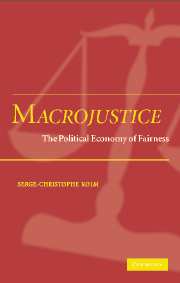Book contents
- Frontmatter
- Contents
- Presentation
- PART ONE BASES: CONSENSUS, FREEDOMS, AND CAPACITIES
- PART TWO OVERALL DISTRIBUTIVE JUSTICE: ELIE (EQUAL LABOUR INCOME EQUALIZATION)
- PART THREE COMPARISONS WITH POLICIES AND PHILOSOPHIES
- PART FOUR THE DEGREE OF COMMUNITY, EQUALITY, RECIPROCITY, AND SOLIDARITY
- PART FIVE COMPARISON WITH ECONOMICS' SOCIAL ETHICS
- 22 Related economic values
- 23 The structure and substance of distributive principles
- 24 Freedom and happiness
- 25 Freedoms, responsibility, desert, merit, equality of opportunity, capacities, capabilities, basic needs
- 26 The theory of equivalence
- 27 Conclusion
- References and bibliography
- Index
26 - The theory of equivalence
Published online by Cambridge University Press: 31 July 2009
- Frontmatter
- Contents
- Presentation
- PART ONE BASES: CONSENSUS, FREEDOMS, AND CAPACITIES
- PART TWO OVERALL DISTRIBUTIVE JUSTICE: ELIE (EQUAL LABOUR INCOME EQUALIZATION)
- PART THREE COMPARISONS WITH POLICIES AND PHILOSOPHIES
- PART FOUR THE DEGREE OF COMMUNITY, EQUALITY, RECIPROCITY, AND SOLIDARITY
- PART FIVE COMPARISON WITH ECONOMICS' SOCIAL ETHICS
- 22 Related economic values
- 23 The structure and substance of distributive principles
- 24 Freedom and happiness
- 25 Freedoms, responsibility, desert, merit, equality of opportunity, capacities, capabilities, basic needs
- 26 The theory of equivalence
- 27 Conclusion
- References and bibliography
- Index
Summary
THE GENERAL THEORY
Presentation and summary
Two states are “individualistically equivalent,” or, for short, “equivalent,” when all individuals are indifferent between them (unanimous indifference). The “principle of equivalence” consists of considering properties in states equivalent in this sense to the actual one. Given that the actual state has to be possible, and may be required to have some desired properties, some other properties may be better satisfied in other, equivalent states, or may be satisfied, or even defined, only in such states. These other properties may for instance be lower inequalities in goods or in freedoms, or equalities, or the highest sum of some valued item, and the actual state is often required to be Pareto efficient. The present chapter considers this theory and its applications (and in particular possible applications to global distributive justice). Section 1 presents the general theory and Section 2 the applications.
The philosophy of the equivalence principle, and notably the limit and possibility of its justification, are first considered (Section 1.2). One then notes the previous cases of application of this theory (Section 1.3), and the important property that non-Pareto-efficient states equivalent to a Pareto-efficient one have to be impossible (Section 1.4). The general theory of equivalence is then outlined in Section 1.5 and formally worked out in Section 1.6. The basic idea consists of taking, as specification of the levels of individual ordinal utilities, parameters for which some required properties are meaningful, such as equality, highest sum (in surplus theory), or lower inequality.
- Type
- Chapter
- Information
- MacrojusticeThe Political Economy of Fairness, pp. 463 - 499Publisher: Cambridge University PressPrint publication year: 2004



